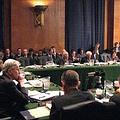 美參議委員會於5日夜晚通過了一項全球暖化法案的里程碑,呼籲在2050年前將溫室氣體排放量降低大約70%。儘管這項法案在參議院中勢必面臨到阻礙,但法案支持者表示,在國會及一般大眾中已顯示出,有愈來愈多的共識認為美國必須採取更積極的行動來對抗全球暖化。
美參議委員會於5日夜晚通過了一項全球暖化法案的里程碑,呼籲在2050年前將溫室氣體排放量降低大約70%。儘管這項法案在參議院中勢必面臨到阻礙,但法案支持者表示,在國會及一般大眾中已顯示出,有愈來愈多的共識認為美國必須採取更積極的行動來對抗全球暖化。
在長達9小時的聽證會中與會者爭論不休,其中不僅考慮了40多項的修正條款,而到聽證會接近尾聲時,委員會以11比8的票數通過該法案。
該法案將成立一套複雜的排放額度交易系統,並以2005年排放量為依據,預期在2020年降低該排放量的20%,而在本世紀中期前達到降低70%的目標,以期能降低全美溫室氣體排放量。此外,該交易系統將允許各企業間進行二氧化碳排放量的交易,以確保達成溫室氣體排放減量的整體目標。
其中一項修正條款中,加入必須實施「低碳燃料標準」的項目,要求在2015年前減少燃料中含碳量5%,並在2020年前達到10%的減量目標。
長期以來,布希政府都拒絕做出任何在溫室氣體排放上的限制,相形之下,此項法案的實施可以說是與其施政方針完全抵觸。美國共和黨員認為該法案將對美國經濟造成不良傷害,不僅會增加能源價格,且對於全球所關切的全球溫室氣體上升的議題助益不大。
此外,法案中已有一套機制來鼓勵中國、印度等國家,在美國的帶領下往前邁進。其中一項條款便是要求美國,對一些不同步為降低排溫室氣體排放採取類似政策的國家實施關稅制度。
A Senate committee approved a landmark global warming bill Wednesday night, calling on the nation to cut greenhouse gas emissions some 70 percent by 2050. Although the measure faces an uphill battle in the full Senate, proponents say the vote signals a growing consensus within Congress and among the American public that the United States needs to take more aggressive action to tackle global warming.
The committee passed the bill by a vote of 11-8 at the close of a contentious hearing that lasted more than nine hours and included consideration of more than 40 amendments.
The bill would establish a complex trading system for emissions credits with the goal of reducing total U.S. greenhouse gas emissions some 20 percent from 2005 levels by 2020 and 70 percent by mid-century.
The trading system would allow companies to buy tradeable allowances to emit the greenhouse gas carbon dioxide to ensure the overall reduction targets are met.
An amendment to the bill also requires a national low carbon fuel standard, calling for a five percent cut in the carbon content of transportation fuels by 2015 and a 10 percent cut by 2020.
The bill stands in contrast to the policies of the Bush administration, which has steadfastly opposed any mandatory limits on U.S. greenhouse gas emissions.
Republicans on the panel argued that the bill would cause undue harm to the U.S. economy, increase energy prices and do little to address the global issue of rising greenhouse gas emissions.
There are already mechanisms within the bill to encourage China, India and other nations to follow U.S. leadership. One clause calls on the United States to impose tariffs on nations who fail to adopt similar policies.
全文及圖片詳見:ENS





